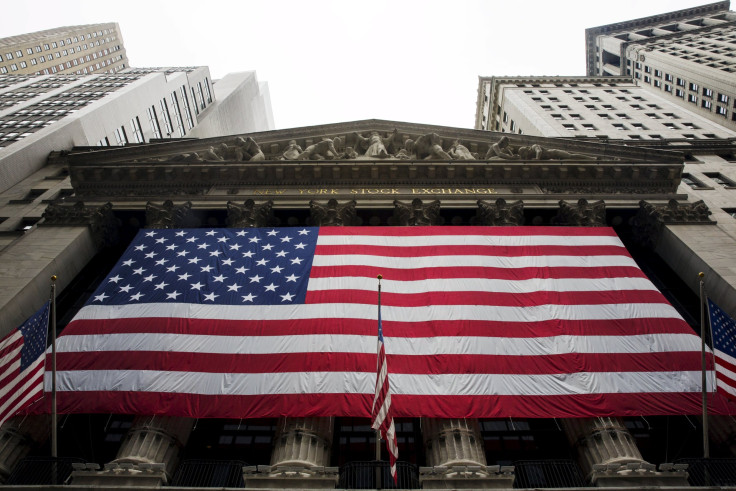Dow Jones Industrial Average Soars 200 Points On ‘aGreekment’

U.S. stocks rallied Monday, with the Dow Jones Industrial Average soaring more than 200 points, as investors cheered news that Greece and its international creditors struck a bailout “aGreekment” following months of uncertainty. After 17 hours of tense negotiations in Brussels, a Greek delegation agreed to impose tough tax and pension reforms in order to secure a third bailout in a reform-for-aid deal for the debt-stricken country. Greece's parliament must begin implementing the reforms by Wednesday.
The Dow (INDEXDJX:.DJI) leaped 202 points, or 1.14 percent, to 17,962.41. The Standard & Poor's 500 index (INDEXSP:.INX) rose 20.62 points, or 1 percent, to 2,097.01. And the Nasdaq composite (INDEXNASDAQ:.IXIC) gained 63.36 points, or 1.27 percent, to 5,061.08.
Stock markets in Europe and Asia gained more than 1 percent Monday on Greece's concessions, with the pan-European Stoxx 600 index up 1.6 percent. The Shanghai composite closed up 2.4 percent after the index tumbled more than 30 percent from its peak in mid-June.
Meanwhile, all 10 sectors in the S&P 500 traded higher, led by gains in the financial, information technology and consumer discretionary sectors.
All 30 stocks in the Dow traded higher Monday as software company Microsoft Corporation (NASDAQ:MSFT) and chemical maker DuPont Co. (NYSE:DD) led the blue-chip index higher, both adding 2 percent. Oil and natural gas producer Chevron Corporation (NYSE:CVX) traded flat, up just 0.1 percent.
Greece agreed to tough reforms to secure a third bailout, totaling 86 billion euros ($95 billion) over three years in a reform-for-aid deal for the debt-stricken country. “Today we had only one objective: to reach an agreement. After 17 hours of negotiations we have finally reached it. Someone can say we have an ‘aGreekment,’” Donald Tusk, president of the European Council, said Monday following a summit with eurozone officials over the weekend.
EuroSummit has unanimously reached agreement. All ready to go for ESM programme for #Greece with serious reforms & financial support
— Donald Tusk (@eucopresident) July 13, 2015Final statements #greek euro summit by @eucopresident @JunckerEU and @J_Dijsselbloem #EUCO http://t.co/ignbbXa0ub pic.twitter.com/Y88gGmzcVc
— EU Council TV News (@EUCouncilTVNews) July 13, 2015#Eurogroup meeting - @J_Dijsselbloem on #Greece http://t.co/S93cU1ucGm pic.twitter.com/1rupWz5nCM
— EU Council TV News (@EUCouncilTVNews) July 13, 2015The weekend's agreement requires Greece to pass laws by Wednesday that would reform labor markets, pave the way for privatization of public assets, and implement independent oversight of Greek fiscal policy before the rest of the eurozone is willing to even consider another Greek aid package.
After a referendum just over a week ago that rejected international creditors’ demands for austerity reforms, the Greek government finished its abrupt about-face this past weekend by accepting even more restrictive austerity terms from the rest of the eurozone.
However, the risks of implementing and carrying out the reforms in the new agreement still “remain high,” said Bill Adams, senior international economist at PNC Financial Services Group, as a delay, a collapse of Greece’s leftist government, or another rebellion of Greek parliamentarians are all possible.
But the alternative is now so clearly unappealing to Greeks that a resolution acceptable to the rest of Europe seems “more likely than it did on Friday,” Adams explained in a research note Monday.
Investors have been spooked the last few weeks by “Grexit” fears, coupled with concerns about China’s benchmark stock exchange following frequent bouts of extreme volatility. If fears ease in the short term, experts say the U.S. Federal Reserve is likely to remain on course to change its monetary policy stance sometime this fall.
“Any reduction in concerns over Greece -- and China -- may simply clear the way for the Fed to begin raising U.S. rates sooner and further than the markets currently anticipate,” Julian Jessop, chief global economist at Capital Economics, said in a note Monday.
© Copyright IBTimes 2024. All rights reserved.





















